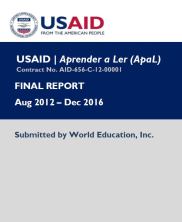The overall goal of the USAID | Aprender a Ler (ApaL) – Learn to Read – project was to improve reading outcomes of students in grades 1- 3 in over 1,000 urban and rural target schools in the Zambézia and Nampula provinces.
The ultimate measure of project success was “more children reading,” in keeping with the overall goal of the project and USAID’s Education Strategy. To achieve this goal, World Education provided key training, coaching, and technical assistance to improve the quality of basic education services, with a specific emphasis on improving early grade reading outcomes. Training and technical assistance were limited to the provinces of Zambézia and Nampula, but incorporated frequent collaboration with central institutions in Maputo.
Project goals were closely aligned with the efforts of the Mozambican authorities to improve quality of education as stated in the Strategic Plan for Education 2012-2016. One of the key goals, as indicated in the contract and accompanying documents, was to build the capacity of local education institutions (LEI) to implement and manage USAID|ApaL activities. A key indicator of activity sustainability will continue to be the ability of these local stakeholders to assume responsibility for activities beyond the scope of direct implementation.
USAID|ApaL worked toward a full handover of responsibilities based on the demonstrated ability of LEIs to take this on. The project was, therefore, implemented using participatory and learning-by-doing approaches, based on World Education's extensive experience, to strengthen the technical and organizational skills of LEIs in line with established structures and processes to ensure the sustainability. This final report provides a thorough overview of the development of the ApaL approach and note key accomplishments throughout the process. World Education, 2017.


